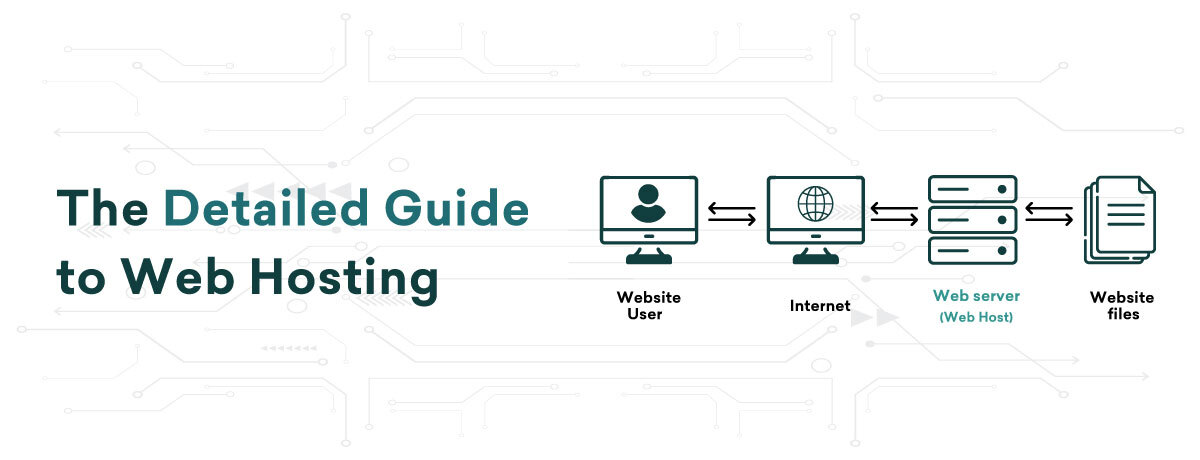Choosing the right hosting for your website project can be challenging. Our Ultimate Guide to Web Hosting can assist you in understanding different hosting options to make an informed decision.
If you are new to web hosting, managed hosting is a great way to begin. Managed hosting simplifies the process of launching your website, eliminating the need to navigate through technical complexities associated with services like VPS and Dedicated Servers. With managed hosting, the hosting company handles technical configurations and server issues. These services are scalable, providing growing websites with the necessary infrastructure to build, launch, and expand their projects easily.
Explore our comprehensive guide to web hosting to discover various hosting types and select the best service to meet your website’s requirements.
Table of Contents
What is Web Hosting?
Web hosting is a service on the internet that enables you to store, manage, and retrieve files, websites, and applications. This service relies on data storage servers and other infrastructure that are connected to the internet, operating 24/7 to ensure constant accessibility to the stored files online.
In essence, when you create a website, all its files are housed on data servers. When a visitor accesses your site, data is transmitted from these hosting servers to their browser. The combined functions of storage, processing, and data transfer over the internet constitute web hosting services.
Entities providing data storage and processing servers for web hosting are known as web hosts. By availing of a web hosting service, you render your website reachable to online users through the data servers provided by hosting companies. With this setup, anyone on the internet can visit your site by entering your domain in a browser.
Since most businesses lack their own servers, they lease server space from web hosting entities. Servers serve as the technical backbone for housing websites and applications. Reputable web hosting providers deliver on the promise of 24/7 online availability and provide crucial technical assistance. This support becomes vital for website owners lacking the necessary technical know-how to handle various aspects of website hosting.
How Does Web Hosting Work?
The primary function of web hosting is to ensure your website is accessible on the internet. It involves data servers that are continuously operational and connected to the internet 24×7, enabling online visitors to access your websites. When a user enters a domain in a web browser like Google Chrome, the website hosted on these servers is retrieved and displayed to them online.
Web hosting providers offer the necessary technologies for your sites to function effectively on the internet. They also provide server management support services to website owners lacking technical expertise in server management. With technical assistance from web hosting companies, website and business owners can concentrate on expanding their business rather than dealing with server maintenance.
What are Different Types of Web Hosting?
Various web hosting services are accessible in the market to cater to your requirements. The primary varieties of website hosting services include:
1. Shared Hosting
Shared hosting is ideal for small and new websites with low traffic. In this service, all web files from various users are stored on one server. This means server resources such as CPU, RAM, and disk space are shared among multiple websites on the same server.
Server resources are shared among various web hosting account users, providing cost-effective access. Due to not leasing the entire server, expenses are divided among users, making shared hosting ideal and budget-friendly for new website owners.
2. Virtual Private Server (VPS) Hosting
This hosting service features a virtual server within a main physical server, splitting a large data storage and processing unit into smaller virtual servers. The division is not physical but virtual, concerning server resources like CPU, RAM, and Disk Space. Each virtual server has independent CPU, RAM, and disk space allocation, offering dedicated server performance at a budget-friendly price.
VPS hosting is beneficial for expanding websites as all projects are hosted in a separate space on the server, though it is shared with other users. This service fulfills your needs for personalized web hosting. While handling traffic spikes and optimizing performance, it can be influenced by other sites on the server. In essence, VPS offers superior performance to shared hosting yet falls below dedicated servers. Furthermore, VPS demands slightly less technical know-how compared to Dedicated hosting.
If you have a resource-intensive web project and seek affordable dedicated hosting services without the necessary technical expertise, you can opt for managed VPS hosting. This way, you can benefit from hosting operations at costs similar to shared hosting, while having hosting infrastructure comparable to dedicated servers. Through reliable VPS hosting servers, you will attain full root control over your servers.
3. Dedicated Hosting
Dedicated hosting grants website owners complete control over servers. It provides exclusive rental for the website, allowing enterprises handling numerous websites and applications to have full root and admin access. This service enables centralized control, including security and operating system management. However, the cost factor may deter small business owners from opting for this level of server resources.
When opting for dedicated hosting, you rent the entire server for exclusive use, making it pricier than other services. Large websites or organizations with high online traffic often choose dedicated hosting for full server control. If you need technical support, consider managed dedicated hosting for seamless web application hosting.
4. Cloud Hosting
In today’s modern world, cloud infrastructure is rapidly gaining popularity. Cloud hosting involves a cluster of interconnected servers within a single network. Therefore, deploying web applications within this connected hosting infrastructure provides maximum scalability and accessibility for your web files.
Hosting servers are susceptible to malfunctions and encounter technical issues when managing resource-intensive websites and applications with high traffic fluctuations. Cloud hosting services provide users with resources distributed across multiple servers, minimizing the risk of downtime caused by server malfunctions.
If your website expands, cloud hosting resources are scalable, allowing your site or app to utilize resources as needed. Essentially, in cloud hosting, resources are virtually limitless for scalability, and you only pay for the resources utilized by your site or app during a specific timeframe.
5. Reseller Hosting
In the hosting industry, a reseller hosting provider acts as a wholesaler while the reseller functions as a retailer. Reseller web hosting involves a smaller hosting company (the retailer) leasing servers and resources from a larger hosting company (the wholesaler), then selling these services to clients for a profit.
Reseller hosting is ideal for small web service companies that cater to local clients, offering a cost-effective solution as they avoid significant upfront investments in infrastructure. Providers of reseller hosting services offer fully white-labeled solutions, enabling resellers to brand their hosting business effectively.
Moreover, reseller hosting providers facilitate billing for end clients and offer technical support to resellers, alleviating concerns about technical issues and web hosting management for the clients of resellers.
Which Web Hosting Service is Right for You?
After learning about various web hosting services, you might be wondering – which is the best hosting for me? When selecting web hosting services, choose a plan that fulfills your hosting needs. Assess if each plan aligns with your web hosting requirements.
Choosing the appropriate web hosting plan involves careful consideration of the following aspects:
– Number of websites to be hosted
– Required disk space and RAM
– Bandwidth (data transfer) limit needed
– Your budget
For novices and small-scale websites with limited hosting budgets, shared hosting services are recommended. If expecting increased website traffic, opt for VPS hosting services. For total server control, website owners should choose dedicated hosting services. Reseller hosting services cater to users starting their web hosting business.
Conclusion
In conclusion, choosing the right web hosting service is critical for your website’s success. Whether you’re a beginner or managing a high-traffic site, understanding options like managed, shared, VPS, dedicated, cloud, and reseller hosting helps match your needs for scalability, control, and budget. Explore our guide to make an informed choice and ensure your site has the solid hosting it needs to thrive online.



